Letters from Georg Hahn
Grandpa Georg Hahn used to listen to the lessons of his children, who had a great respect for him. Below is a letter to his son Louis, written from the POW camp.
Entin, 9 June 1918,
Dear Louis,
I have not heard from you for a long time, and I should be pleased to receive a few lines from you again quite soon. How are things at school and with the violin lessons? Are you making good progress or are you lagging behind in one subject or another? Here in Entin I am also learning a little about agriculture. In addition to guard duty, the crew here does labour service, and I have already helped with the latter, digging, hoeing, piling up potatoes, and so on. Most of the time it is rather hard work that has to be done well and carefully, but I like working in the garden and in the fields, and I think you will also find pleasure in the work. It’s a pity that you can’t do this work for yourself, and keep some cattle and chickens, only not to be dependent on others for butter, milk, eggs and meat, who now want to hold on to everything and hand out nothing. For eggs here you now pay 50 pfg a piece, even more, and still there are none to be found. Hopefully you get on well with Theo, so that you can come with us to Aunt Jet’s in Elspeet for a while during the summer holidays. If the two of you do not get on well and amicably with each other, we will have to refrain from the trip. Give Theo my best regards. Please write to me soon and receive many warm greetings and kisses from
Your Papa.
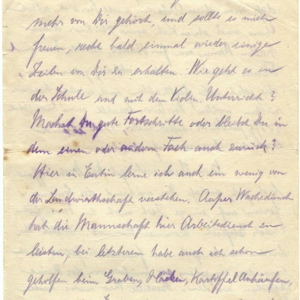 |
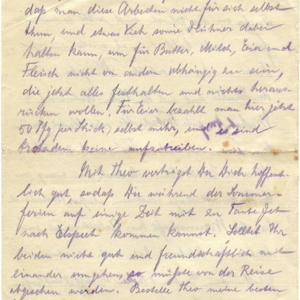 |
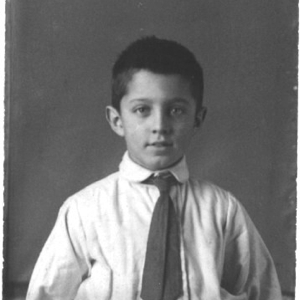 |
|---|---|---|
| Georg Hahn letter to son Louis from Entin POW camp, 9-6-1918 | Georg Hahn letter to son Louis from Entin POW camp, (verso) | Louis Hahn. 24-12-1913 |
Entin, 9 june 1918,
Dear Pa,
Please accept my warmest thanks for your kind letter of 2 June, which I received the day before yesterday; I also congratulate you on your appointment as honorary member of the house painters’ association. I understand that business and life there as well as here are becoming more difficult every day because of the war; at least we are not among the O.W.ers, there will probably not be many more people in this category recently, and it is to be hoped that the desire for peace will soon become general and will lead to an end to the war. I will be happy when I can return home to my family and so will most of my comrades. I would like to hear soon whether it will be possible for Jo to come to Lübeck until 23 June. If Jo can get a pass, I’m sure it can only be arranged in that case, if Jet is able to come to The Hague in time to take over Jo’s work. Without a maid it will also be a difficult job for Jet, but if she can come to Elspeet, she will be willing to do it. Please send my regards to Louis and Lé, Charles and Cor, Guus and Jet in the East Indies, if you write to them. With many warm regards to you I remain,
Your son Georg.
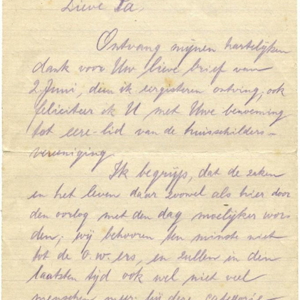 |
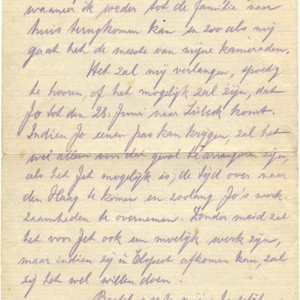 |
|---|---|
| Georg Hahn letter to Pa Aarsse from Entin POW camp, 9-6-1918 |
There were, in those days, harsher punishments than today. For instance, Auntie Do was once put in a dark closet for punishment. Grandpa Louis, who liked to go fishing or walk through town behind the hoempa-orchestra, also sometimes got his ass kicked. There was also a karwats (whip), but here the reports contradict each other. According to Auntie Do, the karwats was a round stick with a leather strap with a knot in it; Grandma would have wielded it once. But according to Grandpa Louis, it was only used as a threat and the karwats had 10 leather straps (with 10 buttons in it) and was used to beat carpets.
Finally, the Aarsse family, including Oma Hahn, were members of the Eglise Wallon. Grandma spoke fluent French; she had been taught in it by a French governess, Mademoiselle Mioulet. Grandpa Georg was a member of the Deutsche Evangelische Luthersche Gemeinde.
